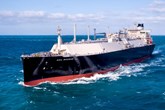NYK begins continuous use of bio-LNG fuel on car carriers
Published by Jessica Casey,
Editor
LNG Industry,
NYK has commenced the continuous use of bio-LNG fuel on its LNG-powered car carriers. The bio-LNG is supplied by Titan Supply B.V. at the Port of Zeebrugge in Belgium. The first vessel to receive the fuel was Daisy Leader on 15 June 2025, and the second was Sumire Leader on 18 July 2025.
Bio-LNG, also known as liquefied biomethane, is purified liquefied methane gas (biogas) produced from biomass feedstock, such as animal manure and food wastes. By capturing methane that would otherwise be released into the atmosphere, greenhouse gas (GHG) emissions over the entire life cycle can be significantly reduced. The bio-LNG fuel supplied by Titan under the mass balance method is recognised as carbon neutral in the whole process from production to consumption (well-to-wake) and is ISCC EU certified, an international standard for sustainability, ensuring compliance with EU regulations and traceability throughout the supply chain.
Titan CEO, Niels den Nijs, said: “I would like to express my sincere respect for NYK's decision to start using bio-LNG fuel. Titan's mission is to provide solutions to help the shipping industry transition to cleaner fuels. We are very pleased to be able to accelerate our decarbonisation efforts together with NYK through this replenishment.”
NYK Fuel Group General Manager, Kaori Takahashi, added: “We are very pleased to begin the continued use of bio-LNG fuel. Bio-LNG fuel is a highly effective option for decarbonising the shipping industry, and we will continue actively promoting its use. This initiative will be an important step toward reducing our environmental impact further and achieving a sustainable future.”
Read the article online at: https://www.lngindustry.com/small-scale-lng/24072025/nyk-begins-continuous-use-of-bio-lng-fuel-on-car-carriers/
You might also like
MOL and GAIL sign charter contract for LNG carrier
Mitsui O.S.K. Lines, Ltd and GAIL (India) Ltd have entered into a long-term charter agreement for an LNG carrier named GAIL BHUWAN.

